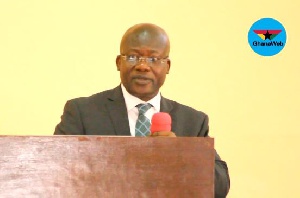 Professor Eric Danquah, Director of the West Africa Centre for Crop Improvement (WACCI)
Professor Eric Danquah, Director of the West Africa Centre for Crop Improvement (WACCI)
Professor Eric Danquah, Founding Director, West Africa Centre for Crop Improvement (WACCI), University of Ghana, has urged the government to scale-up agricultural research investment; to increase productivity and to ensure food security for the people.
More should also be done to transform WACCI into a world class agriculture innovations and entrepreneurship institution for game changing innovations to lift families and communities out of poverty, hunger and malnutrition in the sub-region.
He was speaking at the WACCI-African Union (AU) one million dollar project inception workshop in Accra.
The three-year project to be implemented in Ghana, Burkina Faso and Nigeria, would enable WACCI to work with the public and private sectors of the three nations on crop and soil health improvement for sustainable agricultural production to drive economic transformation.
It aims at addressing issues related to the food and nutrition security objectives of the AU under its Competitive Research Grants Scheme supported by the European Union.
Activities under the WACCI-AU project include maize breeding project in Ghana, tomato breeding programme in Nigeria, rice breeding programmes in Ghana and Burkina Faso, and a cowpea breeding programme in Ghana.
Prof Danquah said over the past 11 years, WACCI had evolved from a small project funded by the Alliance for a Green Revolution in Africa (AGRA) at University of Ghana into the largest PhD in Plant Breeding Education Programme in Africa today and one of the finest globally.
“Working with over 40 national, regional and international partners, WACCI equips the next generation of plant breeders and seed scientists with the knowledge and skills needed for Africa’s agricultural transformation,” he added.
The Centre, since its inception had enrolled 114 PhD students and 36 Master of Philosophy (MPhil) students from 18 African countries.
He said it had churned out six cohorts of 52 PhD graduates who were transforming breeding programmes of National Agricultural Research Institutes in their home countries.
“Our seventh cohort of 14 students will graduate in July, bringing the number to 66,” he said.
Prof Danquah said the Centre was striving for strategic partnerships to address farmers’ needs in some of the most important stable crops including maize, rice, cowpea and tomato in the West and Central Africa sub-region.
He praised Dr John S. Y. Eleblu, the Co-Principal Investigator of the WACCI-AU Project and his entire project team for the hard work in ensuring that the Centre was successful in the grant application.
“While we think about this success, let’s look ahead with foresight and carefully put in place all the checks that we need to put in place to meet expectations.
“Let’s ensure that we spend each dollar very well for the funds have been possible through the sweat and toil of the tax payer in Africa.”
He said: “It is important that we subject our work to rigorous review as a Project Management team for a US$1 million grant is not a small grant even in the Land Grant Universities in the USA or at the Swedish University of Agricultural Sciences; where Prof Rodomiro Ortiz, a collaborator on the project comes from.
“Let’s also remember that we shall be audited by external auditors and the need to keep accurate records and accounts is paramount. We cannot fail the African Union, we cannot fail the farmers, markets and industry”.
Participants at the project inception workshop included Prof Rodomiro Ortiz of the Swedish University of Agricultural Sciences; Dr Maxwell Asante, Crops Research Institute, CSIR, Ghana; Dr Valantine Edgar Troare, INERA, Burkina Faso; and Dr Dorcas Ibitoye, National Institute for Horticultural Research, Nigeria.
In Ghana, the WACCI-AU project would go a long way to contribute to the successful implementation of the Government’s Planting for Food and Jobs Programme.